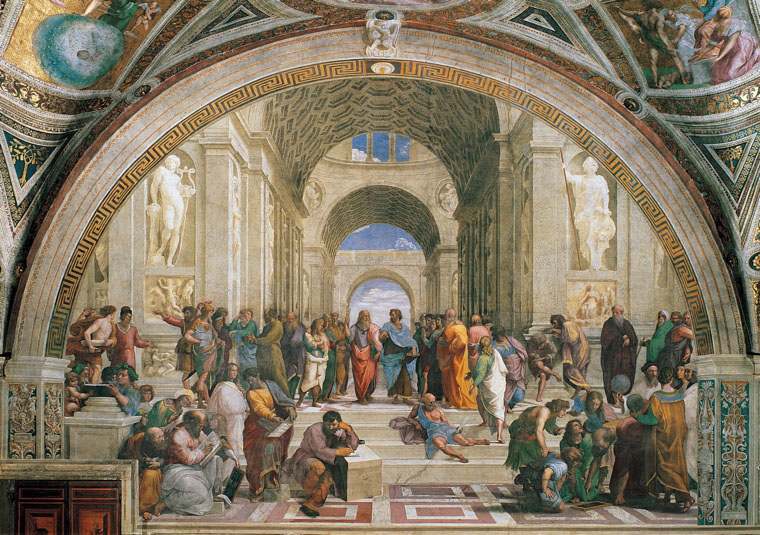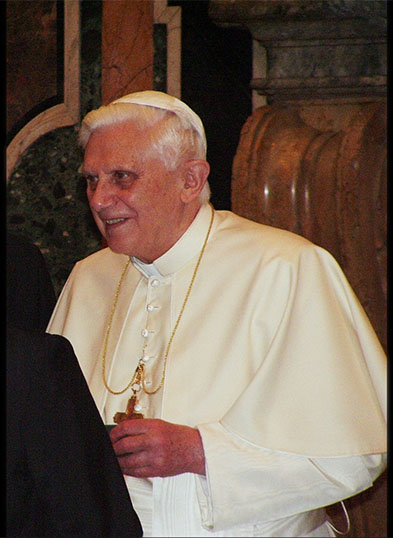The Eurocentric view of intellectual and cultural history of Europe is reflected on the famous fresco, “The School of Athens” that was commissioned by Pope Julius II (d. 1513) to Raphael (d. 1520), a master painter of the Italian Renaissance, to decorate the Papal Palace in the Vatican. To Europeans, the fresco has come to symbolize the marriage of art, philosophy, and science which was claimed to be a hallmark of the European Renaissance that began in Italy. The painting is depicting the Renaissance thinkers with their faces masquerading those of their classical Greek counterparts to symbolize a direct handover of the classical Greek  knowledge to the modern Europeans. Michelangelo takes the face of Heraclitus, Leonardo da Vinci takes the face of Plato, Raphael takes the face of Apelles, and Bramante takes the face of Euclid. The link of Renaissance directly to the classical Greece is intended to undercut the role of Islamic science in the making of the European rebirth, which the West to claim modern science as purely theirs. Quoting a 20th century French social anthropologist Robert Briffault: “It was under the influence of the Arabian and Moorish revival of culture, that the real Renaissance took place. Spain, not Italy, was the cradle of the rebirth of Europe. After steadily sinking lower and lower into barbarism, it had reached the darkest depths of ignorance and degradation when the cities of the Saracenic world, Baghdad, Cairo, Cordova, Toledo, were growing centers of civilization and intellectual activity. The debt of Europe to Islam and Muslims, could find no place in the scheme of European and Christian history. The history of the rebirth of Europe from barbarism is constantly being written without any reference to the influence of Arab civilization except to mention the “triumphs of the Cross over the Crescent,” and “the Reconquista of Spain from the Moorish yoke.”
knowledge to the modern Europeans. Michelangelo takes the face of Heraclitus, Leonardo da Vinci takes the face of Plato, Raphael takes the face of Apelles, and Bramante takes the face of Euclid. The link of Renaissance directly to the classical Greece is intended to undercut the role of Islamic science in the making of the European rebirth, which the West to claim modern science as purely theirs. Quoting a 20th century French social anthropologist Robert Briffault: “It was under the influence of the Arabian and Moorish revival of culture, that the real Renaissance took place. Spain, not Italy, was the cradle of the rebirth of Europe. After steadily sinking lower and lower into barbarism, it had reached the darkest depths of ignorance and degradation when the cities of the Saracenic world, Baghdad, Cairo, Cordova, Toledo, were growing centers of civilization and intellectual activity. The debt of Europe to Islam and Muslims, could find no place in the scheme of European and Christian history. The history of the rebirth of Europe from barbarism is constantly being written without any reference to the influence of Arab civilization except to mention the “triumphs of the Cross over the Crescent,” and “the Reconquista of Spain from the Moorish yoke.”
 When Pope Benedict XVI gave a lecture at the University of Regensburg in Bavaria in September 2006, he stirred a huge controversy by his offensive remarks quoting the 15th century Byzantine Emperor Manuel II, “Show me just what Mohammed brought that was new, and there you will find things only evil and inhuman, such as his command to spread by the sword the faith he preached.” As usual, the European discourse about Islam is always symbolized by hostility and denigration of Prophet Muhammad (pbuh) and distorted narratives about his life and his teachings, because it tends to be an indirect discourse about the self. Pope Benedict’s lecture was entitled “Faith, Reason and University,” and therefore, he did not need at all to mention anything about Islam or Prophet Muhammad, but because he wanted to claim compatibility between Biblical teachings and Greek rationalism at the same time to stress that this compatibility is unique to Europeans, he had to do it at the expense of Islam. “In preaching the compatibility of reason and faith, Pope Benedict, the scholar, deliberately overlooks the fact that the insights of Greek philosophy – its commitment to [reason] – have been brought to medieval Christian Europe by the great Muslim thinkers of the Middle Ages.” In fact, the Church had closed all Greek philosophy schools a century before the arrival of Islam, because they contradicted Biblical teachings. “The School of Edessa” in Syria was closed in 489 CE by Byzantine Emperor Zeno, and “The School of Athens” in Alexandria was closed in 529 CE by Byzantine Emperor Justinian I. Many historians consider the closing of “The School of Athens” in Alexandria in 529 CE as the last light to be put out in Europe as the “Dark Age” closed in. It was Muslims who revived Greek intellectual tradition in the 8th century following Muslim conquest of Byzantium and Persian territories, and it would take another five centuries before Europeans had access to Latin translations of philosophical and scientific works of great Muslim scholars.
When Pope Benedict XVI gave a lecture at the University of Regensburg in Bavaria in September 2006, he stirred a huge controversy by his offensive remarks quoting the 15th century Byzantine Emperor Manuel II, “Show me just what Mohammed brought that was new, and there you will find things only evil and inhuman, such as his command to spread by the sword the faith he preached.” As usual, the European discourse about Islam is always symbolized by hostility and denigration of Prophet Muhammad (pbuh) and distorted narratives about his life and his teachings, because it tends to be an indirect discourse about the self. Pope Benedict’s lecture was entitled “Faith, Reason and University,” and therefore, he did not need at all to mention anything about Islam or Prophet Muhammad, but because he wanted to claim compatibility between Biblical teachings and Greek rationalism at the same time to stress that this compatibility is unique to Europeans, he had to do it at the expense of Islam. “In preaching the compatibility of reason and faith, Pope Benedict, the scholar, deliberately overlooks the fact that the insights of Greek philosophy – its commitment to [reason] – have been brought to medieval Christian Europe by the great Muslim thinkers of the Middle Ages.” In fact, the Church had closed all Greek philosophy schools a century before the arrival of Islam, because they contradicted Biblical teachings. “The School of Edessa” in Syria was closed in 489 CE by Byzantine Emperor Zeno, and “The School of Athens” in Alexandria was closed in 529 CE by Byzantine Emperor Justinian I. Many historians consider the closing of “The School of Athens” in Alexandria in 529 CE as the last light to be put out in Europe as the “Dark Age” closed in. It was Muslims who revived Greek intellectual tradition in the 8th century following Muslim conquest of Byzantium and Persian territories, and it would take another five centuries before Europeans had access to Latin translations of philosophical and scientific works of great Muslim scholars.
Reflecting on medieval Europe of Emperor Manuel II, questioning authority of the Church could result in imprisonment, ex-communication or even being killed. The public burning of heretics became a common sight in medieval Europe. They even persecuted scientists and intellectuals who presented theories that the Church deemed heretical and forbade people from reading their books. Giordano Bruno, Galileo Galilei and Nicholas Copernicus are some of the example victims of the Church’s persecutions, but contrary to Pope Benedict assumption, there was never such a crossroad in Islam in terms of seeking knowledge or use of reason or doing science.
Bibliography
Said, Edward. 1978. Orientalism. London: Penguin Book.
El-Affendi, Abdulwahab. 2010. About Muhammad: The other Western Perspective on the Prophet of Islam. London: Legacy Publishing.
Salama, Mohammad R. 2011. Islam, Orientalism and Intellectual History: Modernity and the Politics of Exclusion. London: I. B. Tauris.
Briffault, Robert. 1928. The Making of Humanity. London: George Allen & Unwin Ltd.
Saliba, George. 1992. “Review of The Optics of Abu Ibn al-Haytham Books I-III, On Direct Vision, A. I. Sabra.” American Oriental Society 112 (3): 528-529.
—. 2007. Islamic Science and the Making of the European Renaissance. Massachusetts: The MIT Press.
Hannan, James. 2011. God’s Philosophers: How Medieval World Laid the Foundations of Modern Science. Washington: Regnery Publishinh.